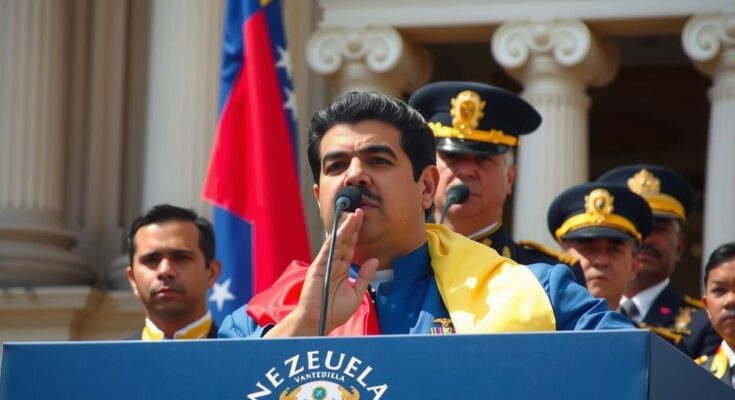Nicolas Maduro has been sworn in for a third term in Venezuela after a disputed election, amidst accusations of voter fraud by opposition candidate Edmundo Gonzalez. Despite international criticism and sanctions, Maduro vows to foster peace and prosperity. The political division is evident as opposition figures mobilize protests, and foreign support continues to be a significant factor in the ongoing power struggle in Venezuela.
Venezuelan President Nicolas Maduro has officially taken oath for a third six-year term amid an ongoing dispute surrounding the legitimacy of his recent electoral victory. His opponent, Edmundo Gonzalez, accused Maduro of voter fraud and projected himself as the rightful winner of the election held in July. Despite international sanctions, notably from the United States, Maduro asserted that his administration would prioritize peace, prosperity, and adherence to law upon his swearing-in ceremony.
In a demonstration of divergent public sentiment, opposition leader Maria Corina Machado publicly protested Maduro’s inauguration, having faced temporary detention during the event. Maduro, reflecting on his political rise from a bus driver to presidency following Hugo Chavez’s death in 2013, has contended with accusations of authoritarianism, particularly during previous elections that excluded opposition candidates. As Maduro’s government continues to face scrutiny, the opposition remains committed to challenging his presidency, having mobilized demonstrations in response to the recent elections.
Following the election results announcement, Maduro claimed to secure 51 percent of the votes, while opposition factions provided evidence purported to show Gonazlez winning by a considerable margin. The refusal of electoral authorities to release detailed voting results exacerbates concerns regarding governmental transparency. Subsequent protests against Maduro’s administration have faced significant crackdowns, leading to numerous arrests and fatalities.
Furthermore, the relationship between the opposition and foreign governments remains a hotspot of contention. Gonzalez’s flight from Venezuela has resulted in his seeking asylum in Spain while expressing concerns to US President Joe Biden regarding Maduro’s oppressive tactics against dissenters. The US continues to voice its recognition of Gonzalez as Venezuela’s rightful leader, highlighting the deep divisions in Venezuelan politics as the country struggles through its ongoing political and economic crises.
Nicolas Maduro assumed the presidency of Venezuela following the death of Hugo Chavez in 2013, and since then, his leadership has been clouded by allegations of authoritarianism and economic failure. The political landscape became even more complex after the 2018 election, which saw many opposition leaders barred from participating. A significant challenge came in 2019 when Juan Guaido declared himself president, prompting international recognition from the United States and its allies. The situation in Venezuela represents a mix of political oppression, mass emigration affecting 7.7 million citizens, and ongoing economic instability. The recent elections, viewed by many as contentious, were marked by accusations of fraud and a lack of transparency.
The inauguration of Nicolas Maduro signifies a critical juncture in Venezuela’s political climate, marked by ongoing disputes over the legitimacy of his election. Despite opposition claims and international sanctions, Maduro seeks to solidify his power while opposition factions like that of Edmundo Gonzalez strive to contest his rule. With civil unrest and international diplomatic efforts continuing, the dynamics in Venezuela remain complex, underscoring the underlying struggles between governance, civil opposition, and international intervention.
Original Source: www.aljazeera.com




